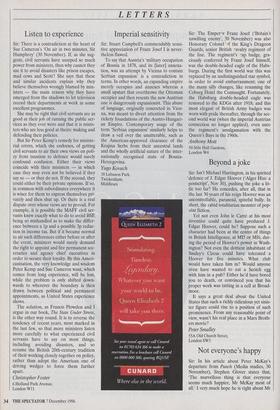LETTERS Listen to experience
Sir: There is a contradiction at the heart of Sue Cameron's 'On air in two minutes, Sir Humphrey' (30 November). If, as she sug- gests, civil servants have usurped so much power from ministers, then why cannot they use it to avoid disasters like prison escapes, mad cows and Scott? She says that these and similar incidents explain why they believe themselves wrongly blamed by min- isters — the main reason why they have emerged from the shadows to let television record their departments at work in some excellent programmes.
She may be right that civil servants are as good at their job of running the public ser- vices as they ever were and that it is minis- ters who are less good at theirs: making and defending their policies.
But Sir Peter Kemp's remedy for ministe- rial errors, which she endorses, of getting civil servants to air their own views on poli- cy from taxation to defence would surely confound confusion. Either their views coincide with their ministers — in which case they may even not be believed if they say so — or they do not. If the second, they could either be their private opinions. If so, in common with subordinates everywhere it is wiser for them to express themselves pri- vately and then shut up. Or there is a real dispute over whose views are to prevail. For example, it is possible the IVIAFF civil ser- vants knew exactly what to do to avoid BSE being so mishandled as to make the differ- ence between a 1 p and a possible 3p reduc- tion in income tax. But if it became normal to air such differences either before or after the event, ministers would surely demand the right to appoint and fire permanent sec- retaries and agency chief executives in order to secure their loyalty. By this Ameri- canisation, the very knowledge and wisdom Peter Kemp and Sue Cameron want, which comes from long experience, will be lost, while the problem is only shifted down- wards to wherever the boundary is then drawn between political and permanent appointments, as United States experience shows.
The solution, as Francis Plowden and I argue in our book, The State Under Stress, is the other way round. It is to reverse the tendency of recent years, most marked in the last few, so that more ministers listen more carefully to what experienced civil servants have to say on most things, including avoiding disasters, and so resume the British 20th-century tradition of their working closely together on policy, rather than adopt the American one of driving wedges to force them further apart.
Christopher Foster
6 Holland Park Avenue, London W11


















































































 Previous page
Previous page